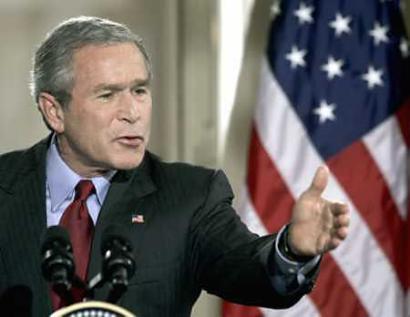
The New York Times offered a strong critique of one of George W. Bush’s exit interviews — and Bush National Security Advisor Stephen Hadley has just issued his protestations.
The Times offered this powerful punch:
It was skin crawling to hear him tell Mr. Gibson that the thing he will really miss when he leaves office is no longer going to see the families of slain soldiers, because they make him feel better about the war. But Mr. Bush’s comments about his decision to invade Iraq were a “mistakes were made” rewriting of history and a refusal to accept responsibility to rival that of Richard Nixon.
At one point, Mr. Bush was asked if he wanted any do-overs. “The biggest regret of the presidency has to have been the intelligence failure in Iraq,” he said. “A lot of people put their reputations on the line and said the weapons of mass destruction” were cause for war.
After everything the American public and the world have learned about how Mr. Bush and Vice President Dick Cheney manipulated Congress, public opinion and anyone else they could bully or lie to, Mr. Bush is still acting as though he decided to invade Iraq after suddenly being handed life and death information on Saddam Hussein’s arsenal.
The truth is that Mr. Bush, Mr. Cheney and Defense Secretary Donald Rumsfeld had been chafing to attack Iraq before Sept. 11, 2001. They justified that unnecessary war using intelligence reports that they knew or should have known to be faulty. And it was pressure from the White House and a highly politicized Pentagon that compelled people like Secretary of State Colin Powell and George Tenet, the Central Intelligence director, to ignore the counter-evidence and squander their good names on hyped claims of weapons of mass destruction.
Stephen Hadley offers in his statement the definitive dismissal of Vice President Cheney’s continuing under-the-breath grumblings that Sadam Hussein did have weapons of mass destruction stockpiled, but he then rejects the Time‘s claims that the Bush/Cheney team pressured the intelligence community to generate cause for a war they wanted.
In a statement issued from his office today, Hadley writes:
Sunday’s New York Times contains an editorial expressing inaccurate and incomplete statements on pre-war intelligence and the war in Iraq.
While the President has repeatedly acknowledged the mistakes in the pre-war intelligence, there is no support for the Times’ claim that the President and his national security team “knew or should have known [the intelligence] to be faulty” or that “pressure from the White House” led to particular conclusions. Nothing in the many inquiries conducted into these matters supports the view of the Times‘ Editorial Board. Indeed, the independent Silberman-Robb Commission and the Senate Select Committee on Intelligence concluded that no political pressure was brought to bear on the Intelligence Community.
As the President has stated, he regrets the intelligence was wrong, but it was intelligence that members of Congress, foreign governments as well as the Administration all believed to be accurate. Working with Congress, the President has since put in place a number of intelligence reform measures to try to ensure that such mistakes do not happen again.
While Saddam Hussein did not have stockpiles of weapons of mass destruction, he was a threat, and his removal has opened the door to a democratic Iraq in the heart of the Middle East that is an ally of the United States.
The New York Times continues to have difficulty acknowledging the undeniable success of the President’s decision to surge an additional 30,000 troops into Iraq. Because of the surge, Iraq is a more stable and secure country. It is the success of the surge that is allowing American troops to withdraw from Iraq and return home with a record of heroic service and still unheralded success.
I have two quick points.
First, Richard Perle told me in October 2002 that “we would not find WMDs in Iraq.” Richard Perle said this to me in a conversation which I have written about before — and at that point, Perle was still very much a part of the inner circle of Cheney, Wolfowitz, Rumsfeld, and other fellow travelers. We have many others who have since made clear that the administration cherry-picked intelligence that fit pre-held biases towards war.
Secondly, Hadley’s justification of the invasion of Iraq on the basis of removing a bad leader and seeding some elements of democratic society is wrong-headed.
America does not have unlimited resources to topple the world’s bad leaders and engage in unlimited nation building. Thus, traditionally America has had to depend on a complex array of tools to apply leverage here and there to achieve outcomes that we and the world need.
By invading a mostly boxed-in nation and displacing a rational, self-dealing thug — we have undermined our ability in many other parts of the world to affect the calculations of other thuggish leaders who will not trust American rationality. They will see an America that has tilted towards justice crusades no matter what the costs, and this assessment in turn will make their behavior less predictable and more dangerous.
Hadley makes as clear as I have seen it a Bush administration embrace of an “emotional war” — one that undermined America’s core interests and which had repercussions globally for how other states viewed us and our behavior.
The Iraq War is a total disaster in that it has made America look small, limited, incapable of achieving its objectives, and as a state run by emotional whims and not serious strategists.
Hadley’s statement only further justifies the overall assessment of the New York Times.
— Steve Clemons


17 comments on “Hadley Objects to Deluder-in-Chief”